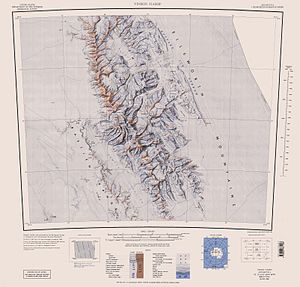Rutford Ice Stream: Difference between revisions
Created page with 'thumb|300px|right|Radarsat image of ice streams, including the Rutford, flowing into the Ronne Ice Shelf [[File:Vinson-Map.jpg|thumb|Sentinel Range map]…' |
No edit summary |
||
| Line 11: | Line 11: | ||
The ice stream is situated in a deep trough which is a tectonic feature between the Ellsworth Mountains and the Fletcher Promontory. Because of this the ice stream position may have been stable for millions of years. The bed of the ice stream reaches 6,500 feet below sea level. Therefore between the bed of the ice stream and the height of the Ellsworth Mountains there is a vertical relief of 5 miles over a distance of only 25 miles.<ref name=wais2001>{{cite book |last=Doake | first=C.| coauthors = H. Corr, A. Jenkins, K. Makinson, K. Nichalls, C. Nath, A. Smith, D. Vaughan| editor-first=Richard | editor-last=Alley |editor2-first=Robert|editor2-last=Bindschadler| title=The West Antarctic Ice Sheet: Behaviour and Environment |publisher=American Geophysical Union |year=2001 |pages=221–235 |chapter=Rutford Ice Stream, Antarctica|isbn=0-87590-957-4| lastauthoramp=y}}</ref> At the upper (inland) end of the ice stream the ice thickness reaches 1,000 feet, falling to around 2300 m in the trough. Flow speed reaches a maximum of around 400 metres per year about 40 km inland from where the ice stream meets the Ronne Ice Shelf and starts to float on the sea.<ref name=wais2001/> | The ice stream is situated in a deep trough which is a tectonic feature between the Ellsworth Mountains and the Fletcher Promontory. Because of this the ice stream position may have been stable for millions of years. The bed of the ice stream reaches 6,500 feet below sea level. Therefore between the bed of the ice stream and the height of the Ellsworth Mountains there is a vertical relief of 5 miles over a distance of only 25 miles.<ref name=wais2001>{{cite book |last=Doake | first=C.| coauthors = H. Corr, A. Jenkins, K. Makinson, K. Nichalls, C. Nath, A. Smith, D. Vaughan| editor-first=Richard | editor-last=Alley |editor2-first=Robert|editor2-last=Bindschadler| title=The West Antarctic Ice Sheet: Behaviour and Environment |publisher=American Geophysical Union |year=2001 |pages=221–235 |chapter=Rutford Ice Stream, Antarctica|isbn=0-87590-957-4| lastauthoramp=y}}</ref> At the upper (inland) end of the ice stream the ice thickness reaches 1,000 feet, falling to around 2300 m in the trough. Flow speed reaches a maximum of around 400 metres per year about 40 km inland from where the ice stream meets the Ronne Ice Shelf and starts to float on the sea.<ref name=wais2001/> | ||
The Rutford ice stream varies its speed by as much as 20% every two weeks, in response to variations in the | The Rutford ice stream varies its speed by as much as 20% every two weeks, in response to variations in the tides.<ref>[http://www.sciencedaily.com/releases/2006/12/061221075130.htm ScienceDaily, ''Tidal Motion Influences Antarctic Ice Sheet'' Dec. 24, 2006]</ref> | ||
==References== | ==References== | ||
{{reflist}} | {{reflist}} | ||
[[Category:Glaciers of | [[Category:Glaciers of Queen Elizabeth Land]] | ||
Latest revision as of 08:20, 9 April 2019


Rutford Ice Stream (79°0’0"S, 81°0’0"W) is a major Antarctic glacier, partially in the British Antarctic Territory. It is about 180 miles long and over 15 miles wide and drains southeastward between the Sentinel Range of the Ellsworth Mountains and Fletcher Ice Rise into the southwest part of Ronne Ice Shelf.
The Ice Stream marks the edge of the British Antarctic Territory and where it reaches the Constellation Inlet is the landmark defining the northern end of the line marking the western boundary of Queen Elizabeth Land.
Geography
The glacier was named by the American surveyors for geologist Robert Hoxie Rutford, a member of several American expeditions to Antarctica; the leader of the University of Minnesota Ellsworth Mountains Party of 1963-1964 and Director of the Division of Polar Programmes for the US National Science Foundation 1975-1977.[1]
The ice stream is situated in a deep trough which is a tectonic feature between the Ellsworth Mountains and the Fletcher Promontory. Because of this the ice stream position may have been stable for millions of years. The bed of the ice stream reaches 6,500 feet below sea level. Therefore between the bed of the ice stream and the height of the Ellsworth Mountains there is a vertical relief of 5 miles over a distance of only 25 miles.[2] At the upper (inland) end of the ice stream the ice thickness reaches 1,000 feet, falling to around 2300 m in the trough. Flow speed reaches a maximum of around 400 metres per year about 40 km inland from where the ice stream meets the Ronne Ice Shelf and starts to float on the sea.[2]
The Rutford ice stream varies its speed by as much as 20% every two weeks, in response to variations in the tides.[3]
References
- ↑ Rutford Ice Stream: Geographic Names Information System] - United States Geological Survey
- ↑ 2.0 2.1 Doake, C.; H. Corr, A. Jenkins, K. Makinson, K. Nichalls, C. Nath, A. Smith, D. Vaughan (2001). "Rutford Ice Stream, Antarctica". in Alley, Richard & Bindschadler, Robert. The West Antarctic Ice Sheet: Behaviour and Environment. American Geophysical Union. pp. 221–235. ISBN 0-87590-957-4.
- ↑ ScienceDaily, Tidal Motion Influences Antarctic Ice Sheet Dec. 24, 2006